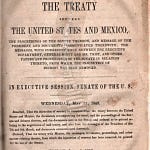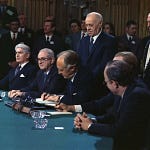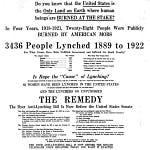This Day in Legal History: 28 Countries United Against the Axis Powers
On January 2, 1942, a landmark event in the annals of international law and global diplomacy unfolded when twenty-eight nations unified under a significant pledge: they agreed not to seek separate peace treaties with the Axis Powers during World War II. This collective decision was part of the Declaration of the United Nations, signed the previous day. It represented a major commitment by the Allied nations to maintain a united front against the Axis Powers, consisting of Germany, Italy, and Japan.
The term "United Nations," coined by U.S. President Franklin D. Roosevelt in December 1941, effectively captured the essence of this alliance. The idea was to create a coalition that was not only military in nature but also diplomatic, presenting a unified opposition to the aggression of the Axis. The signatories included major powers like the United States, the United Kingdom, the Soviet Union, and China, along with a diverse array of other nations, each bringing unique strategic, economic, and military strengths to the table.
The path to this agreement was marked by escalating global tensions and the realization that a fragmented approach against the Axis Powers could lead to disastrous results. The attack on Pearl Harbor in December 1941, which prompted the United States' entry into the war, was a turning point. It spurred the urgent need for a coordinated and unified strategy among the nations fighting against the Axis.
The Declaration of the United Nations was not just a military alliance but a significant diplomatic gesture. It signaled a commitment to a post-war order where international cooperation would be paramount. This agreement laid the groundwork for the modern concept of collective security, a principle that became a cornerstone of the United Nations Charter established in 1945.
Moreover, this event underscored the importance of legal agreements in international relations. It demonstrated how treaties and declarations could be used effectively to bind countries together in pursuit of a common goal. The commitment of these 28 nations to not negotiate separately with the Axis Powers was a strategic move that helped to isolate the enemy and reinforce the Allies' resolve.
This day in legal history thus reflects a moment when international law and diplomacy converged to shape the course of world events. It marked a departure from the traditional bilateral treaties and alliances that had previously dominated international relations, paving the way for a new era of multilateralism and cooperation. The unity and resolve displayed by these 28 nations not only played a crucial role in the outcome of World War II but also laid the foundation for a new international order that would emerge in the post-war world.
The Securities and Exchange Commission (SEC) is intensifying its efforts to make companies disclose more about the impact of climate change in their financial statements. This comes as the SEC is close to finalizing its climate disclosure rules, with a focus on companies like Estée Lauder, Oracle, and Eli Lilly. The SEC's queries to these companies have centered on why there is less information on climate risk in their annual financial reports compared to their sustainability reports.
The SEC's 2022 proposal would require detailed information on greenhouse gas emissions and climate-related risks to operations. This rule was expected to be finalized by 2023 but is now postponed to 2024. Currently, U.S. securities law doesn't mandate specific climate change disclosure, but material risks to businesses must be disclosed. This has led to inconsistencies, where companies often disclose more in sustainability reports aimed at a broader audience, including customers and NGOs, than in financial filings intended for regulators and investors.
In 2021, the SEC announced a focus on these reporting gaps and has been persistent in its inquiries, asking companies to justify their materiality assessments and provide supporting data. Companies like Eli Lilly and Estée Lauder have responded to SEC queries about extreme weather costs, often arguing that these have not yet materially affected their finances. In most cases, the SEC staff has accepted these explanations, although they continue to scrutinize the materiality and relevance of such risks.
Beyond Inc., a retailer, responded to the SEC's inquiries about carbon emissions' impact on consumer choices, highlighting other competitive factors like product quality and shipping. Meanwhile, Penn Entertainment Inc., a casino and hotel operator, agreed to include new disclosures about the impact of severe weather on their operations.
Independently, companies are increasingly including climate risk details in their financial reports. In 2022, 150 S&P 500 companies added new standalone climate-related risk disclosures in their 10-Ks, covering both sustainability goals and physical risks of climate change. This trend indicates a growing recognition of climate risk in corporate reporting, spurred by both investor and regulatory interest.
SEC Presses Companies on Climate Risk With New Rules on Horizon
The U.S. National Labor Relations Board (NLRB) has recently made several rulings that significantly bolster union organizing, setting the stage for a transformative year in labor relations. These rulings, initiated by President Joe Biden's appointees, have made it easier for workplaces to unionize beyond the traditional secret ballot election process, facilitating unionization of franchise and contract workers and expanding worker conduct protections under U.S. labor law.
These changes have prompted business groups and employers to challenge the decisions in court, anticipating an increase in union organizing. Union organizing has seen a rise since the COVID-19 pandemic, with major companies like Starbucks, Amazon, Wells Fargo, and Apple facing unprecedented unionizing efforts. Unions filed nearly 2,600 petitions for elections in fiscal 2023, a significant increase from previous years, although union membership in the private sector remains around 6%.
Key to these developments is an August ruling in the case involving Cemex Construction Materials Pacific LLC. The NLRB stated that when a union demonstrates majority support in a workplace, an employer must recognize the union or request an election. This ruling deviates from the decades-old requirement of winning secret ballot elections before employer recognition.
The White House and NLRB supporters argue this change counters widespread illegal union-busting tactics by employers. Critics, however, see this as conflicting with a 1974 Supreme Court ruling and argue it imposes unionization without proper employee consent. The NLRB's new rule, effective December 26, which accelerates the union election process, and another rule effective in February regarding bargaining with franchise and contract workers, are also pivotal.
The NLRB has also broadened labor law protections, covering actions like profane outbursts from legitimate complaints and advocacy for non-employees such as unpaid interns. These rulings, combined with the Cemex standard, are expected to ease union organization and recognition.
As 2024 unfolds, these developments suggest a significant increase in election petitions and unfair labor practice complaints, urging employers to be prepared for potential union elections at any time. The NLRB's recent actions mark a notable shift in U.S. labor relations, potentially leading to a more robust union presence in the American workforce.
Unions poised to capitalize on U.S. labor board rulings that bolstered organizing | Reuters
In 2024, U.S. courts are set to address several significant antitrust issues affecting various industries, including real estate, technology, and healthcare. A key focus is the real estate industry, where national brokers face litigation over the buyer broker commission, a practice where sellers pay agents a percentage of the home sale price. The industry was shaken by a $1.8 billion class-action verdict in Missouri, and related lawsuits are proliferating in other states. Additionally, the D.C. Circuit will decide whether the Justice Department can investigate the National Association of Realtors, amidst antitrust concerns.
The Federal Trade Commission (FTC) is involved in multiple cases that could redefine its powers. In Seattle, a ruling is expected on the FTC's lawsuit against Amazon for allegedly keeping prices high, a claim Amazon denies. In Texas, the FTC's case against private equity firm Welsh Carson Anderson & Stowe could challenge established corporate law principles if it proceeds.
Facebook also faces a potential 2024 trial in the FTC's case accusing it of monopolizing the personal social network market. Another major antitrust area involves allegations of price-fixing through algorithms, as seen in the case against RealPage. This company is accused of conspiring with property managers to maintain high rental prices using its pricing technology, a claim it denies.
Google faces multiple legal challenges, including a Department of Justice case over its dominance in internet search and ad tech business, and litigation from Epic Games over its Play store practices. Google has agreed to a $700 million settlement in a related case, but the broader implications of these cases for tech giants remain to be seen. These court battles in 2024 are poised to answer crucial questions about the scope and enforcement of U.S. antitrust laws across various sectors.
Key US antitrust questions the courts could answer in 2024 | Reuters
U.S. prosecutors are challenging former President Donald Trump's claim of "absolute immunity" from criminal charges related to his actions in the 2020 election. Special Counsel Jack Smith, overseeing the prosecution, submitted a court filing arguing that the U.S. Constitution and legal tradition do not support granting former presidents immunity for actions taken while in office. Smith contends that such immunity would effectively place presidents above the law.
Trump has asserted that his presidency provides him with absolute immunity from prosecution, a claim disputed by Smith. The focus of the legal argument is whether a former president can be charged for crimes committed in office, particularly those aimed at illegally remaining in power after losing an election.
Trump, a leading candidate for the Republican presidential nomination in 2024, is appealing a lower court's decision that denied his request to dismiss the election charges based on his immunity claim. His legal team argues that prosecuting him for actions related to his official responsibilities would undermine the presidency.
The case is set for arguments before a three-judge panel of the U.S. Court of Appeals for the District of Columbia Circuit on January 9. Trump faces multiple criminal prosecutions, including charges of defrauding the United States, obstructing Congress, and violating voters' civil rights in efforts to overturn his loss to Joe Biden. This case is one of four criminal prosecutions against him, two of which are related to his alleged efforts to subvert the 2020 election.
Trump has denounced the prosecutions as politically motivated, aimed at damaging his 2024 election campaign. The timing of the court's decision is crucial, as it will determine whether Trump's trial, scheduled to begin in March, will proceed on time. The progress of the case has been on hold pending the resolution of the immunity appeal, with Smith previously requesting the Supreme Court to expedite a decision, a request that was denied. The issue remains with the D.C. Circuit court for now.
US urges appeals court to reject Trump immunity claim in 2020 election case | Reuters













